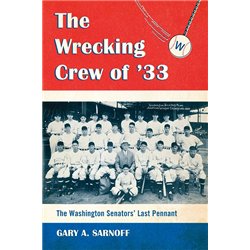Ty Cobb and his Tigers returned to Washington for their third and final series at Griffith Stadium in 1926. Cobb behaved himself – on the field. Before the first game he delivered a letter to the Washington Senators office, addressed to Griffith. The letter was clearly intended to get Griffith’s goat:
“Dear Sir:
“On our last trip to Washington it fell to my experience of one of your many outbursts, in which you enlisted the aid of some of our local papers in broadcasting the fact that I should be curbed. Naturally this statement, coming from you, did not please me. I have waited until I could gather some facts concerning this statement before writing.”
Cobb wrote about Griffith’s acquisition over his inappropriate behavior, about attacking the umpires, and how he held up the game during the Ladies Day game. He compared Harris’ outburst against umpire Brick Owens in the Yankees game and mentioned how that held up the game and resulted in a fine. He opined that Griffith was a vicious man and charged the Nats owner with prevarication.
Griffith refused to comment to the press, but did say he was going to show the letter to League President Ban Johnson and predicted a showdown to follow. [Nothing was ever mentioned about the letter again].
There were more distractions in store for the Senators. Players spoke out at a team meeting prior to one game. It was reported that Walter Johnson, who never said anything negative to or about anyone, talked about a lack of support when he pitched and signaled out a few for lack of hustle. It seemed to be additional fuel to feed the fire for a team already having problems with dissention, but suddenly Washington began to win. Stan Coveleski, believed to be washed up, began to look like the pitcher of old when he hurled back-to-back shutouts in consecutive starts. Johnson pitched three consecutive wins, including a four-hit victory over the Red Sox. Newcomers General Crowder and George Murray were also beginning to win, and when Crowder hurled a two-hit win over the Red Sox for the Nats tenth consecutive win, the 1926 Senators were suddenly back in contention.
A chance of a third consecutive pennant was suddenly revived. The Senators were now twelve games over 500 (72-60), in third place, and the first place Yankees were in the midst of a slump. But their miracle hopes quickly vanished when losing four straight at Cleveland. They did bounce back to win four in a row over Cobb and he Tigers, but their fate had been sealed. They were now playing for 1927.
At St. Louis, the Senators won four straight to assure themselves of a winning season and more than eighty-wins, and when Joe Judge homered in the ninth to beat the White Sox at Chicago, they were guaranteed a finish in the first division with a share of the World Series spoils.
At Chicago, Walter Johnson said good bye. He departed for home prior to the conclusion of the season. His final record in 1926 was 15-16 with a 3.61 ERA, which did not sit well with the All-Time Great. He spoke about 1927, and regaining his superstar status.
When the season finished with a loss to the White Sox, and an 81-69 record, the players shook hands and said goodbye. “I’ll see you in Tampa next spring,” they told one another, and then they scattered to their homes across the land.
1926 Washington Senators – Part One
1926 Washington Senators – Part Two
1926 Washington Senators – Part Three
1926 Washington Senators – Part Four
1926 Washington Senators – Part Five
1926 Washington Senators – Part Six
Gary is the author of The Wrecking Crew of ’33; The Washington Senators’ Last Pennant. Gary has written for Nats News, Minor League News, and for the Biography Project of the Society for American Baseball Research. He lives in Arlington, Virginia.






